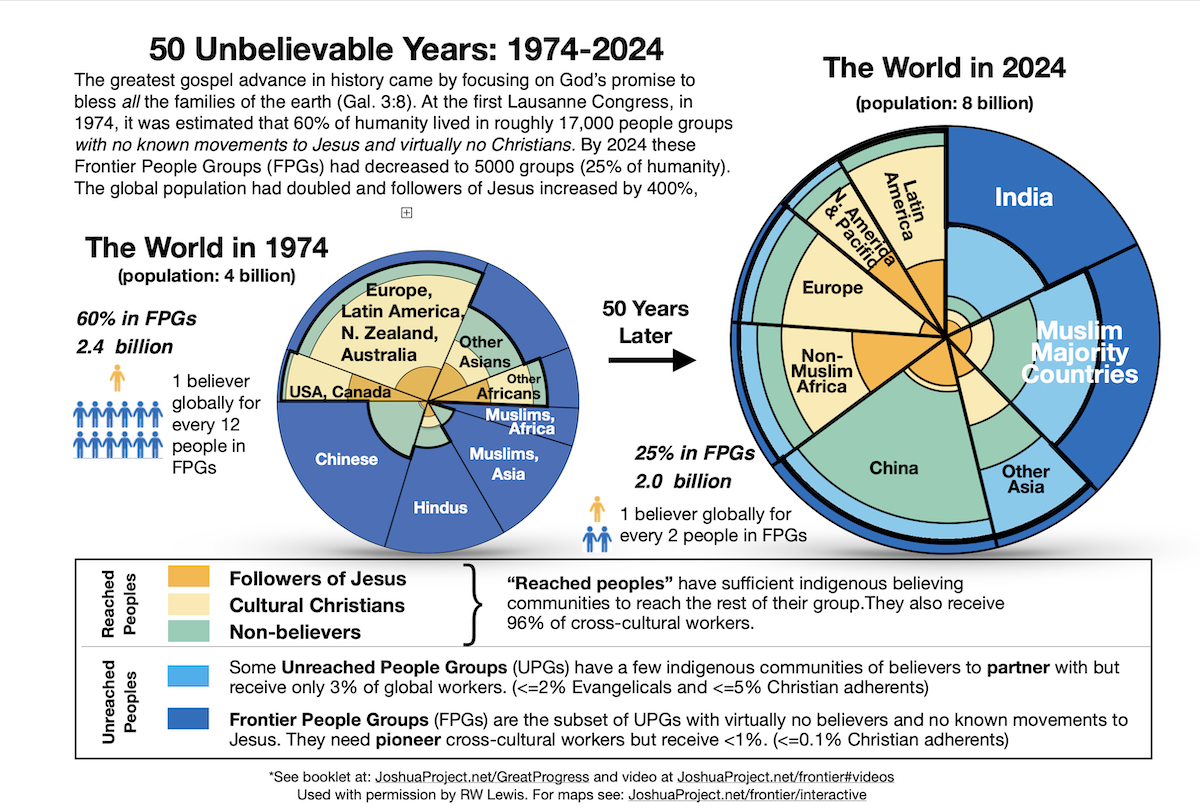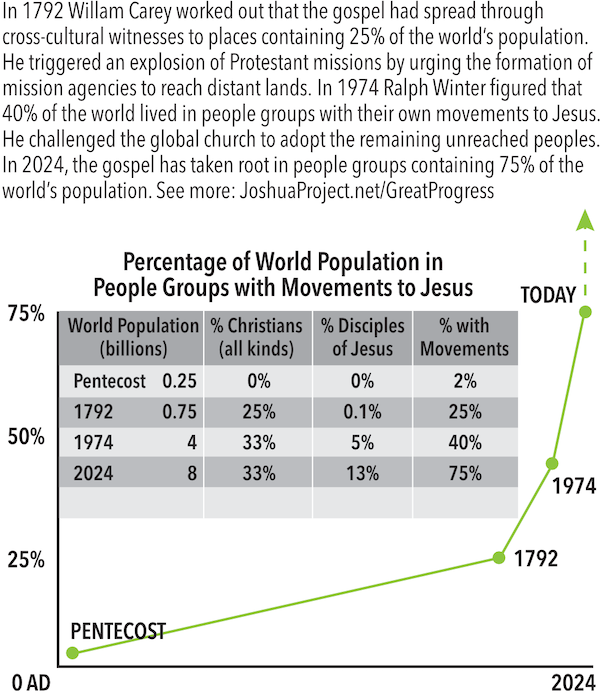
"The Law and the Prophets were proclaimed until John. Since that time, the good news of the kingdom of God is being preached…” (Luke 16:16).
The steady advance toward the fulfillment of all things is far more epic than we can imagine. This fulfillment is the “telos” Jesus predicted saying, “And this gospel of the kingdom will be preached in the whole world as a testimony to all nations, and then the end (telos) will come” (Matt 24:14). Jesus established his kingdom on earth by his life, death, and resurrection. This beachhead heralded the increasing battle for the supremacy of God’s rule on earth, both in the hearts of people and in the earth’s families or peoples. As citizens of the kingdom of light, we need to clearly understand how to help advance his kingdom at the edges.
When Christ died on the cross as an atonement for our sins, Paul said, he “rescued us from the dominion of darkness and brought us into the kingdom of the Son he loves” (Col 1:13-14). This is the first “edge of the kingdom” that Jesus came to overcome: eradicating the darkness of our hearts. The end goal or completion (telos in Greek) of his reign in our lives is freedom from sin, righteousness apart from the law, everlasting life, and blamelessness before him (Rom 6:22, 10:4, 1 Cor 1:8). We work toward this goal through submitting more and more of our lives to God through Christ, “purifying ourselves of everything that contaminates body and spirit, perfecting holiness out of reverence for God” (2 Cor 7:1). Paul reminds Timothy that “the goal (telos) of our instruction is love that comes from a pure heart, a good conscience, and a sincere faith” (1Tim 1:5).
The resurrected Jesus concluded 40 days of teaching the disciples about the kingdom of God (Acts 1:3) with an emphasis on the second “edge of the kingdom,” saying, “All authority in heaven and on earth has been given to me. Therefore, go and make disciples of all nations, baptizing them in the name of the Father and of the Son and of the Holy Spirit, and teaching them to obey everything I have commanded you. And surely, I am with you always, to the very end of the age” (Matt 28:18–20). We are all called to advance his kingdom beyond its edges in our generation to all the peoples of the earth, a task which he entrusted to his followers as his ambassadors. It is in Christ that we become “fellow workers for the kingdom of God” (Col 4:11).
Missionaries and the Battle Beyond the Edges of the Kingdom
Many Christians alive today have forgotten the life of their forefathers before the light of the kingdom was brought to their people group. Slavery, child sacrifice, pedophilia, temple prostitution, etc., were deeply imbedded in the “civilized” circum-Mediterranean cultures. St. Augustine reports that as late as the 4th century, the Romans were still addicted to watching humans slaughtered in their arenas by specially trained wild animals or gladiators. Constant tribal warfare and the glorying in brutal rape, murder, and pillage characterized the tribes from the Northern European Vikings, Goths and Slavs. In the isolated tribes of the global jungles (e.g. South America, Africa, Northeast India, and thousands of islands), things like head- hunting, kidnapping and raping women, cannibalism, and genocide were almost universally practiced with no shame.

In every century, the first witnesses spreading Christ’s kingdom beyond the edges to new people groups were almost always martyred or tortured and imprisoned. Catholic and Protestant missionaries themselves (almost without exception) tried valiantly not to engage in violence, even in the face of martyrdom, but instead to bring a message of hope, peace, and reconciliation. However, unfortunately, their half-converted compatriots, traders and conquerors who often preceded them into the places where Christ had not been named, quickly reverted to formerly unthinkable “heart of darkness” barbarism in the face of savagery. This testament to the evil power of fear ironically often occurred after they had traded weapons of warfare and societal destruction, from knives and guns to drugs and alcohol, in exchange for valuables they sought—furs, spices, porcelain, silk, tea, sandalwood, tobacco, and, yes, slaves.
Christian missionaries consistently defended the humanity of all peoples, and British and American evangelical revivalists managed to overturn thousands of years of defense of slavery. However, Darwinism immediately reinstated the pre-Christian perspective that other peoples were less human (less evolved). So- called “Christian nations” engaged in horrific civil and global wars, succeeding in killing millions, even with more humane rules of engagement. The most destructive world war in history was built upon the idea of an evolutionary “super race,” eugenics, and survival of the fittest.
Given this seemingly dismal record, it is surprising that, despite great population growth globally, the gospel has currently taken root in peoples representing 75% of the world’s population. And even when barely 10% of a people group have become believers, the gospel has greatly transformed them, so there is now global condemnation of slavery, genocide, wars, sexual exploitation or perversion, infanticide, murder, and many other formerly widely tolerated evils, even in places where such practices continue. Although, sadly, once people groups and nations throw off the knowledge of Christ and of his Word, the reversion into pre-Christian ethical standards is surprisingly rapid.
Going with Christ Beyond Today’s Edges
Jesus’ disciples must constantly seek to go into the “regions beyond” (2 Cor 10:16) the edges of the kingdom. The first edge, namely the Spirit of God conquering the souls of humanity, one person at a time, depends upon the disciples of Jesus consistently pushing forward the edges of the second, because how can they believe if they have not heard, and how can they hear unless preachers are sent (Rom 10:13–15)? Only the indwelling Holy Spirit transfers the soul from the kingdom of darkness to the kingdom of light, so, in that sense, even Christian populations are “twilight zones” in which the battle continues to rage in every soul not fully given over to Jesus Christ. But what about those peoples and places which have not yet even heard of God’s love for them?
The US Center for World Mission (now Frontier Ventures) was founded on the conviction that there were edges of the kingdom, namely “frontiers” where the kingdom of light had not yet penetrated the kingdom of darkness. This conviction came initially from the research of Dr. Ralph Winter, my father, who discovered and presented at the 1974 Lausanne Congress on World Evangelization the shocking fact that only 13% of the world’s non-Christians were in the same ethnic group as the churches of the world, while a staggering 87% were in people groups with no known churches or movements to Christ (60% of the world’s population). These types of people groups were first clarified at the 1972 consultation on “The Gospel and Frontier Peoples” (presentations edited by R. Pierce Beaver were published by William Carey Library). How was it that most of the mission world thought the job of cross-cultural world evangelization was almost over?
Dr. Winter was so stunned by his own discovery and so concerned at the lack of any reaction by the mission world at the time, that he left his professorship at the Fuller Seminary’s School of World Mission to found the USCWM. The three purposes for the USCWM, written down by his wife Roberta Winter in “Once More Around Jericho,” page 225, were:
1. Study, evaluate, monitor all current mission effort.
2. Push back the barriers limiting present efforts.
3. Penetrate the last frontiers.
Fifty years later, the kingdom has spread immensely, but frontiers still exist. No longer is 60% of the world’s population in people groups with no churches or kingdom advance (1974, 2.4 billion people). Now only 25% of the world’s population is without any known growing indigenous witness (2 billion people). Given that the population of the world has doubled in the same 50-year period (4 billion in 1974, 8 billion in 2024), this means the gospel is spreading at an exponential rate into people groups beyond the edges of the kingdom.

But, as Dr. Winter observed, the advance of the gospel into new peoples, new languages, and new cultural expressions was nearly always done by highly dedicated missionary teams or mission structures— second decision task-focused groups he called “sodalities.” The gospel can spread organically within a people group, household to household along relational lines; however, to cross difficult barriers, of language and culture, and of distance, special structures and the specific goal of taking the gospel beyond the edges have almost always been required. Nevertheless, 96% of mission teams today go to help Christians in other places, being totally unaware of the fact that the kingdom still has edges beyond which the gospel has not penetrated. The edges need to be clarified again!
The knowledge of the gospel, the kingdom of light, has spread rapidly throughout the world in the past 50 years alone! (See the “50 Unbelievable Years” pie chart graph on the previous page.) During that time, the population of committed Christians globally has quadrupled (400%). Many more non-believers are now in the same people groups as committed followers of Jesus (from 13% of non-believers in 1974 to 37% of non- believers today). 97% of the population of “frontier people groups” (a subset of “unreached people groups” with essentially NO believers among them) are either Muslims (55%) or Hindus (42%). The dark blue “frontier people groups” can be seen by name with details on a sortable map at joshuaproject.net/frontier/interactive.
Conclusion
God promised that “all the families of the earth” would be blessed through Abraham’s descendants (Gen 12:3, 22:18, 26:4). This blessing involves two distinct “edges” of the kingdom: The establishment of the reign of Christ in our hearts as disciples and the ever-expanding kingdom to the ends of the earth—the invisible “yeast in the dough” that impacts every family, tribe, and people group that it enters. Jesus commanded his followers to finish fulfilling God’s promise to Abraham. New teams must arise today to bring Christ’s kingdom beyond the edges until the prophecy is complete and “the earth is filled with the knowledge of the glory of the Lord as the waters cover the sea” (Hab 2:14).
Author
RW LEWIS
RW Lewis wrote “a church for every people” in her Bible in 1980 and has worked toward that goal with her husband, Tim, ever since, helping to found the USCWM/ FV, Frontiers and Telosfellowship.org.
All Scripture references are from the NIV.
Subscribe to Mission Frontiers
Please consider supporting Mission Frontiers by donating.
Subscribe to our Digital Newsletter and be notified when each new issue is published!